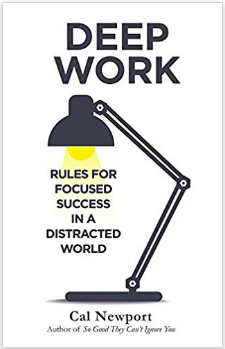
In This Episode…
Over the last few episodes I have been exploring the ideas presented in Cal Newport’s excellent book “Deep Work”. Having understood what deep work is, I’m now into the second part of the book that lays out the 4 rules of deep work. Rule 1 is called “Work Deeply” and in this episode I share what I’ve learnt about working deeply and the challenges that presents to me.
Episode Summary
00:09 – Background to this episode – I have been exploring the ideas presented in Cal Newport’s book “Deep Work“. In this episode I share the lessons I learned from the chapter called “Rule #1 – Work Deeply”
01:13 – The biggest challenge people face in doing their work is the constant fight they have against the distraction of their desires (which include eating, sleeping, sex, social media, web surfing and television).
01:41 – Fighting the desires expends willpower which eventually depletes meaning the desires will usually win out. A way to combat desires is to develop routines and rituals.
02:46 – Cal Newport suggests choosing a depth philosophy and presents four options:
- 03:15 – The Monastic – the elimination of radical reduction of any shallow obligations
- 04:02 – The Bi-Modal – divide your time between deep pursuits and everything else.
- 05:05 – The Rhythmic – transform your deep work into a simple regular habit.
- 06:02 – The Journalistic – fit deep work into your schedule whenever you can.
06:44 – The Monastic approach might not be possible for your work situation. The Journalistic might be appealing but it is very difficult to do.
08:13 – The most practical mode for me seems to be the Rhythmic mode – it is one I have used before when writing my second book on memory improvement.
09:23 – Cal Newport suggests that ritualising my work will allow me to make the most of deep work opportunities. He says there are four questions that need to be answered when creating my ritual:
- Where will I work?
- How long will I work for?
- How will I work once I start?
- How will I support my work?
10:31 – He talks about the concept of a Grand Gesture and explores the power of collaboration in this chapter but I am going to skip over those in this episode.
11:29 – Execution of a strategy is the key to making it happen. He cites 4 disciplines of execution that really helped him and they are:
- Focus on the wildly important – get specific on what you are trying to create and achieve.
- Act on the lead metrics – focus on the activities you have control over.
- Keep a compelling scoreboard – keep track of those metrics and publish the results.
- Create a cadence of accountability by having regular meetings (perhaps a weekly review).
13:38 – Cal shares some insights in the concept of downtime, especially finishing your work at the end of the day by “shutting down”. There are a number of reasons why this is important:
- Downtime aids the development of deeper insights
- Downtime helps recharge the energy needed to work deeply
- Any work that evening downtime replaces is usually not that important
15:11 – This part of the book has been very interesting to explore and understand. I do think I need to get even clearer on what my deep work is before I start applying this.
